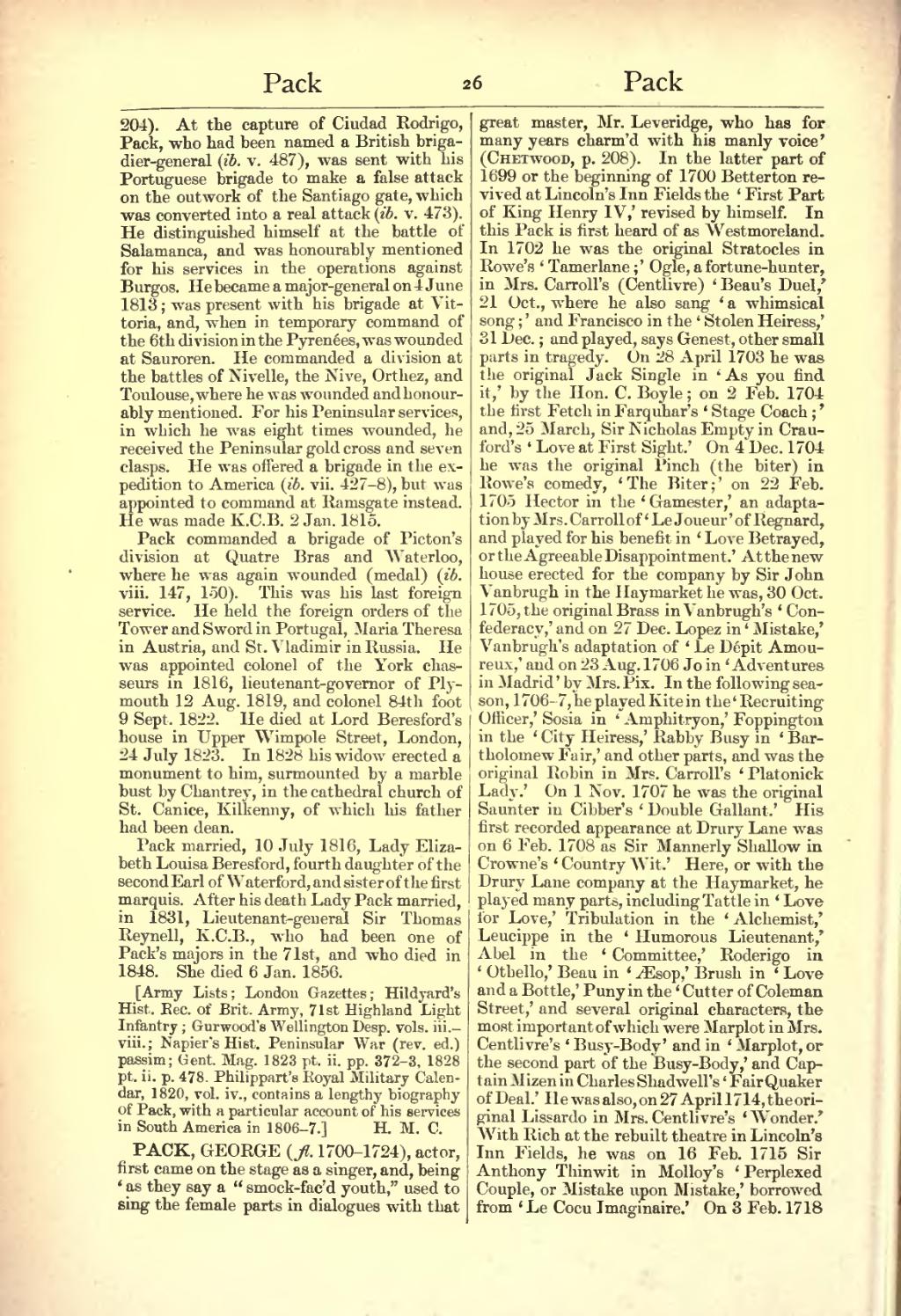204). At the capture of Ciudad Rodrigo, Pack, who had been named a British brigadier-general (ib. v. 487), was sent with his Portuguese brigade to make a false attack on the outwork of the Santiago gate, which was converted into a real attack (ib. v. 473). He distinguished himself at the battle of Salamanca, and was honourably mentioned for his services in the operations against Burgos. He became a major-general on 4 June 1813; was present with his brigade at Vittoria, and, when in temporary command of the 6th division in the Pyrenées, was wounded at Sauroren. He commanded a division at the battles of Nivelle, the Nive, Orthez, and Toulouse, where he was wounded and honourably mentioned. For his Peninsular services, in which he was eight times wounded, he received the Peninsular gold cross and seven clasps. He was offered a brigade in the expedition to America (ib. vii. 427–8), but was appointed to command at Ramsgate instead. He was made K.C.B. 2 Jan. 1815.
Pack commanded a brigade of Picton's division at Quatre Bras and Waterloo, where he was again wounded (medal) (ib. viii. 147, 150). This was his last foreign service. He held the foreign orders of the Tower and Sword in Portugal, Maria Theresa in Austria, and St. Vladimir in Russia. He was appointed colonel of the York chasseurs in 1816, lieutenant-governor of Plymouth 12 Aug. 1819, and colonel 84th foot 9 Sept. 1822. He died at Lord Beresford's house in Upper Wimpole Street, London, 24 July 1823. In 1828 his widow erected a monument to him, surmounted by a marble bust by Chantrey, in the cathedral church of St. Canice, Kilkenny, of which his father had been dean.
Pack married, 10 July 1816, Lady Elizabeth Louisa Beresford, fourth daughter of the second Earl of Waterford, and sister of the first marquis. After his death Lady Pack married, in 1831, Lieutenant-general Sir Thomas Reynell, K.C.B., who had been one of Pack's majors in the 71st, and who died in 1848. She died 6 Jan. 1856.
[Army Lists; London Gazettes; Hildyard's Hist. Rec. of Brit. Army, 71st Highland Light Infantry; Gurwood's Wellington Desp. vols. iii.–viii.; Napier's Hist. Peninsular War (rev. ed.) passim; Gent. Mag. 1823 pt. ii. pp. 372–3, 1828 pt. ii. p. 478. Philippart's Royal Military Calendar, 1820, vol. iv., contains a lengthy biography of Pack, with a particular account of his services in South America in 1806–7.]
PACK, GEORGE (fl. 1700–1724), actor, first came on the stage as a singer, and, being ‘as they say a “smock-fac'd youth,” used to sing the female parts in dialogues with that great master, Mr. Leveridge, who has for many years charm'd with his manly voice’ (Chetwood, p. 208). In the latter part of 1699 or the beginning of 1700 Betterton revived at Lincoln's Inn Fields the ‘First Part of King Henry IV,’ revised by himself. In this Pack is first heard of as Westmoreland. In 1702 he was the original Stratocles in Rowe's ‘Tamerlane;’ Ogle, a fortune-hunter, in Mrs. Carroll's (Centlivre) ‘Beau's Duel,’ 21 Oct., where he also sang ‘a whimsical song;’ and Francisco in the ‘Stolen Heiress,’ 31 Dec.; and played, says Genest, other small parts in tragedy. On 28 April 1703 he was the original Jack Single in ‘As you find it,’ by the Hon. C. Boyle; on 2 Feb. 1704 the first Fetch in Farquhar's ‘Stage Coach;’ and, 25 March, Sir Nicholas Empty in Crauford's ‘Love at First Sight.’ On 4 Dec. 1704 he was the original Pinch (the biter) in Rowe's comedy, ‘The Biter;’ on 22 Feb. 1705 Hector in the ‘Gamester,’ an adaptation by Mrs. Carroll of ‘Le Joueur’ of Regnard, and played for his benefit in ‘Love Betrayed, or the Agreeable Disappointment.’ At the new house erected for the company by Sir John Vanbrugh in the Haymarket he was, 30 Oct. 1705, the original Brass in Vanbrugh's ‘Confederacy,’ and on 27 Dec. Lopez in ‘Mistake,’ Vanbrugh's adaptation of ‘Le Dépit Amoureux,’ and on 23 Aug. 1706 Jo in ‘Adventures in Madrid’ by Mrs. Pix. In the following season, 1706–7, he played Kite in the ‘Recruiting Officer,’ Sosia in ‘Amphitryon,’ Foppington in the ‘City Heiress,’ Rabby Busy in ‘Bartholomew Fair,’ and other parts, and was the original Robin in Mrs. Carroll's ‘Platonick Lady.’ On 1 Nov. 1707 he was the original Saunter in Cibber's ‘Double Gallant.’ His first recorded appearance at Drury Lane was on 6 Feb. 1708 as Sir Mannerly Shallow in Crowne's ‘Country Wit.’ Here, or with the Drury Lane company at the Haymarket, he played many parts, including Tattle in ‘Love for Love,’ Tribulation in the ‘Alchemist,’ Leucippe in the ‘Humorous Lieutenant,’ Abel in the ‘Committee,’ Roderigo in ‘Othello,’ Beau in ‘Æsop,’ Brush in ‘Love and a Bottle,’ Puny in the ‘Cutter of Coleman Street,’ and several original characters, the most important of which were Marplot in Mrs. Centlivre's ‘Busy-Body’ and in ‘Marplot, or the second part of the Busy-Body,’ and Captain Mizen in Charles Shadwell's ‘Fair Quaker of Deal.’ He was also, on 27 April 1714, the original Lissardo in Mrs. Centlivre's ‘Wonder.’ With Rich at the rebuilt theatre in Lincoln's Inn Fields, he was on 16 Feb. 1715 Sir Anthony Thinwit in Molloy's ‘Perplexed Couple, or Mistake upon Mistake,’ borrowed from ‘Le Cocu Imaginaire.’ On 3 Feb. 1718
